Many people may not realise the beer in their pint glass contains a product made from fish. Now the Campaign for Real Ale (Camra) is calling on brewers to investigate alternatives for their drinks. But why is fish put in beer anyway?
Ask somebody to list the classic ingredients of beer and the chances are they will come back with: hops, malt, barley and water, with a bit of yeast thrown in for good measure.
It is unlikely the swim bladder of fish would be on the list, but isinglass – a gelatine made using the organ – is in fact very likely to be in your average pint.
Used since the 19th Century as a fining agent to make beer clear, bright and more attractive to drinkers, the odourless added extra is used widely by brewers, from mass-produced brands to small microbreweries.
Its prevalence poses a problem for vegetarians and vegans, many of whom do not realise they need to tread carefully when ordering at the bar.
Now Camra is calling on breweries to examine alternatives to isinglass in beer, is a brewing revolution on the cards?
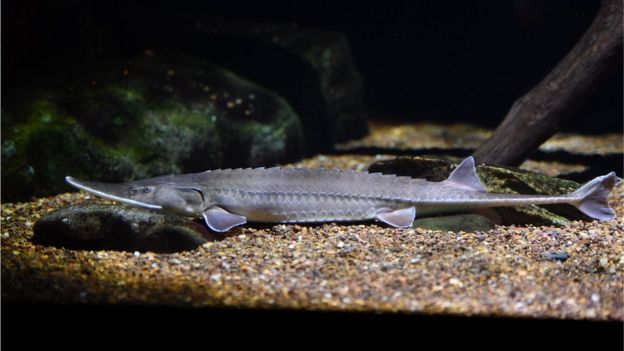 The swim bladders of fish such as sturgeon are used to make isinglass
The swim bladders of fish such as sturgeon are used to make isinglass
While flocculation – the process where the substance mixes with the yeast in the beer to make it less hazy – is useful for many breweries and landlords looking for beer to settle quickly, Twisted Barrel Brewery made the decision not to use isinglass to clear its beers soon after setting up in 2014.
Brewery owner Tim Bosworth, a long-term vegetarian who went vegan two years ago, said he was shocked when he first learned about the ingredient.
“It’s kind of disgusting to think about, even to people who eat meat, and it’s something that’s not talked about,” he said.
“Nobody really wants to advertise that they filter their beer through dead fish.”
Vegan beer is being made by a number of breweries
As well as the ethical and environmental issues around veganism, the Coventry-based brewer has another more practical objection: the effect of isinglass on the taste.
“It takes away a lot of the flavour from the beer,” Mr Bosworth said.
“More people know now that beer doesn’t have to be clear – it doesn’t matter what it looks like, and isinglass is just used for aesthetics.”
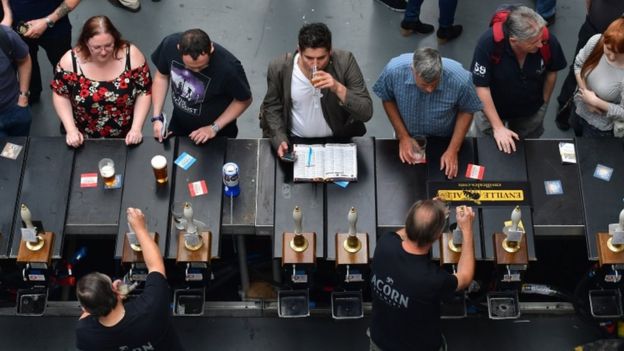 Not all drinkers are aware that isinglass is used by many breweries to make their beer clear more quickly
Not all drinkers are aware that isinglass is used by many breweries to make their beer clear more quickly
When Manchester’s Marble Brewery started out in 1997, the production of vegetarian-friendly ales was not a consideration, but the desire to be authentic meant the brewery steered clear of fining agents.
Its stance means Marble is one of a handful of breweries to be approved by the Vegetarian Society, something that’s earned it a loyal following.
While not averse to using odd ingredients – from Japanese citrus fruit yuzu to bergamot – the idea of filling a pint full of fish bladders left a bad taste with the brewery’s brains trust.
“When I first came here I asked [brewery owner] Jan if we needed to be vegetarian, and she said yes we do because it’s a very big thing for us,” said James Kemp, who took over as head brewer this year.
“We’d lose a lot of customers if we weren’t part of it.
“We always try and make our beers as clear as they can be through great brewing – it’s a source of pride for us.”
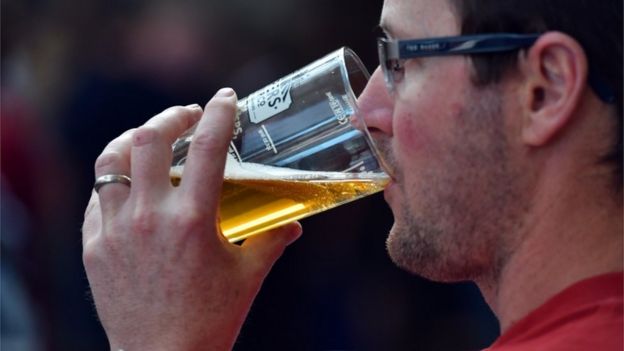 Alternative finings, such as products from seaweed or Irish moss, can also be used to help beer clear more quickly
Alternative finings, such as products from seaweed or Irish moss, can also be used to help beer clear more quickly
If the likes of Marble got the ball rolling with unfined beer, then the momentum has picked up with the recent British brewing boom.
As the number of active breweries has soared – from fewer than 700 in 2009 to more than 1,500 in 2016 – the number of those that leave out isinglass and other items has grown.
Alternative vegetarian-friendly finings, such as products derived from the algae Irish moss or seaweed, are also on the market.
But why did breweries start using finings in the first place?
Beer author, journalist and Camra stalwart Roger Protz traces it to the 19th Century, when pale ales challenged porters and stouts in the popularity stakes and transparent glasses replaced stone, china and metal drinking vessels.
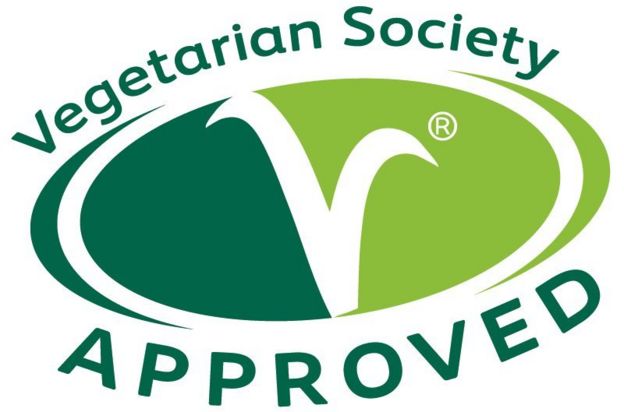 A handy symbol for beer-loving vegetarians looking for ale free of animal products
A handy symbol for beer-loving vegetarians looking for ale free of animal products
The reason it has carried on, he says, is the pressure to turn over beers in the shortest time possible.
“Particularly in this day and age of ‘pubcos’, people want to get the beers on as quickly as possible, and isinglass is a shortcut to help them,” he said.
It is not just ethical concerns driving the increase. Mr Protz – himself a vegetarian for more than 25 years – points to increasing customer knowledge of different beer styles, such as German wheat beers, that are naturally cloudy, meaning British drinkers no longer naturally fear the worst when served a less-than transparent pint.
Mr Protz is encouraging more breweries to follow the lead of Guinness, which announced last year it would stop using isinglass in its products.
Unsurprisingly, the practice is enthusiastically backed by the Vegetarian Society.
John Soonaye, from the society, said the exemption alcoholic drinks enjoy on nutritional labelling regulations makes life harder for ale-drinking vegetarians.
However, with greater consumer awareness about the provenance of food and drink and a number of breweries signing up to earn the society’s approved trademark, he hopes the situation will improve.
“The use of isinglass in drinks production is a major frustration for vegetarian beer lovers as there are very few obvious ways to identify whether or not it has been used,” he said.
“Personally, there’s nothing I like more than savouring a cool pint of real ale on a lazy Saturday afternoon, so if Camra can help encourage breweries to make more beers suitable for more people, that’s a brilliant thing.”
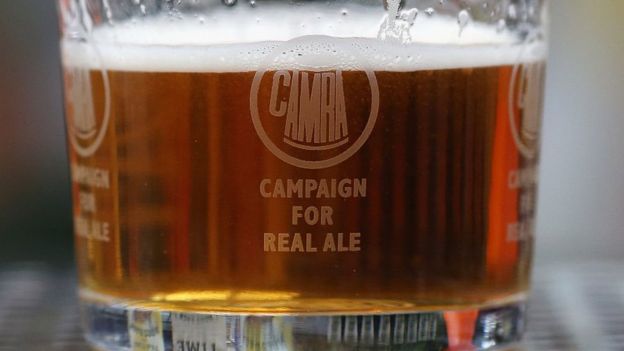 Camra’s Roger Protz says more breweries should move away from using isinglass, to give vegans and vegetarians more choice at the bar
Camra’s Roger Protz says more breweries should move away from using isinglass, to give vegans and vegetarians more choice at the bar
Where once brewers skipping on finings was very much swimming against the tide, could we be looking at a situation where a flocculated beer filled to the gills with isinglass is a thing of the past?
“I think with the craft beer revolution more breweries aren’t using isinglass,” said Mr Bosworth.
“People are moving away from the idea beer needs to be clear.
“All of the people who have brought back beer to our bar thinking it was off have had it explained to them, and once they were told about it they realised the beer was fine.
“Some people do tell me they drink with their eyes, and if they want a clear beer with finings then that’s up to them, but nobody has left my bar unsatisfied.”
Mr Protz agrees greater consumer awareness could lead to the change.
“I think that the pressure is on,” he said.
“Even if you’re not a vegetarian you must wonder why on earth are people putting fish bladders in beer?”
Source: http://www.bbc.com/news/uk-england-37350233
Comments
comments
